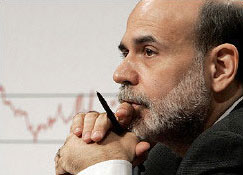 Could the Democratic debacle in Massachusetts derail Ben Bernanke’s Senate confirmation to a second four-year term as Fed chairman?
Could the Democratic debacle in Massachusetts derail Ben Bernanke’s Senate confirmation to a second four-year term as Fed chairman?
I wouldn’t bet on it, but i didn’t think the Dems would lose Teddy Kennedy’s senate seat either. And there is strong smell of panic among Democrats and a growing push to assuage popular fury on the right and the left.
With the Huffpost cheering them on, two more Democrats announced that they would vote against Bernanke. Barbara Boxer of California and Russell Feingold of Wisconsin added their names to the official NO column. Senator Bernie Sanders, independent of Vermont, announced more than a month ago he would not only oppose Bernanke but put a hold on the vote. By the end of the day on Friday, a spokesman for Harry Reid, the Senate majority leader, was saying Reid didn’t know if he could round up 60 votes to clear a filibuster and hadn’t himself decided whether to support him.
The Republicans are probably even more hostile, even though Bernanke is a Republican who was originally nominated to the Fed by George W. Bush. The longtime GOP opponents include three Jims of the far right – Bunning, Inhofe and DeMint. But one of them is genuinely important: Richard Shelby of Alabama, ranking member of Senate Banking.
Ay yay yay. What’s going on here? Bernanke’s term as Fed chairman will expire on Jan. 31, and he has already been approved by Senate Banking. What’s new?
You can argue that Bernanke has been hurt by new revelations that the New York Fed apparently asked AIG in late 2008 not to disclose touchy information about its bailout in SEC filings. The touchiest information was the list of Wall Street firms and European banks that were paid 100 cents on the dollar for about $45 billion worth of AIG credit default swaps they had. On Tuesday, the New York Fed sent 250,000 pages of documents to the House Oversight and Government Reform Committee, and published a lengthy memo to explain itself.
But Bernanke, based in Washington, doesn’t seem to have played a role in that particular scuffle. More importantly, the gory details of the AIG bailouts – including the list of lucky counterparties, like Goldman Sachs, Deutsche Bank and Societe Generale — have been public for a very long time now. Everybody, including Bernanke, agrees that the AIG bailouts were the ugliest, messiest and most infuriating of all the rescues undertaken by the Fed and the Treasury.
It’s true that Bernanke was complicit in Fed’s mistakes leading up to the crisis. As a Fed governor, he strongly supported keeping interest rates at 1 percent, arguably feeding to the housing bubble. Nor did the Fed try to stop sleazy mortgage lending, even though it had the power.
But it’s also true that Bernanke has been heroic in responding to the crisis once it arrived. He didn’t just lower interest rates. He took Fed policy to places few had even imagined before, using every tool and lever he had or could design to fight the epic collapse in credit markets.
The time to go after Bernanke, for those who wanted to, was when his nomination was before the Senate Banking committee. To their credit, Bernie Sanders, Dick Shelby and a few others were against him at that point.
The problem with opposing his nomination now is that it threatens to leave the Federal Reserve rudderless – never a good idea, but especially not when the economy and markets are still fragile.
Nominating a successor to Bernanke, getting him or her approved by Senate Banking and then getting that person approved by the Senate, where NOTHING passes without a supermajority of 60 votes, would take months.
If that’s the way things were to go, Bernanke could probably remain chairman until his successor arrived. Though his term as chairman would have expired, his 14-year term as a Fed governor still has years to go.
But to the markets, Bernanke would be a lame duck who wouldn’t have the same credibility. He would likely be seen as hesitant to undertake big new initiatives or to chart course changes, and he might have more trouble herding the hawks and doves together on the Federal Open Markets Committee. What would that mean? Uncertainty, reluctance to invest and possibly higher interest rates if foreign investors began to worry about lax controls over inflation. At this juncture, that strikes me as a dangerous game to be playing.
- Bulenox: Get 45% to 91% OFF ... Use Discount Code: UNO
- Risk Our Money Not Yours | Get 50% to 90% OFF ... Use Discount Code: MMBVBKSM
Disclaimer: This page contains affiliate links. If you choose to make a purchase after clicking a link, we may receive a commission at no additional cost to you. Thank you for your support!



Leave a Reply